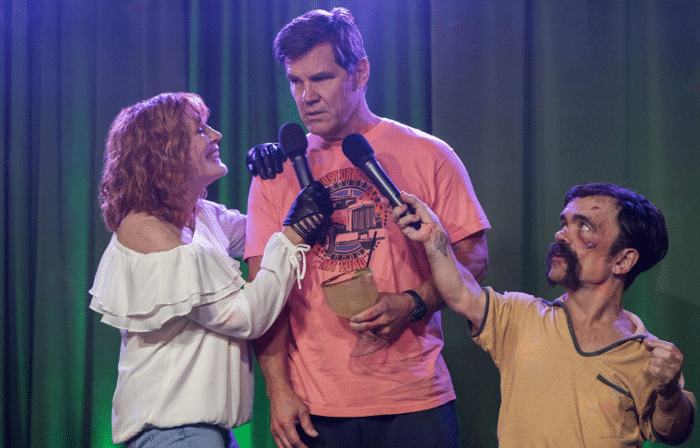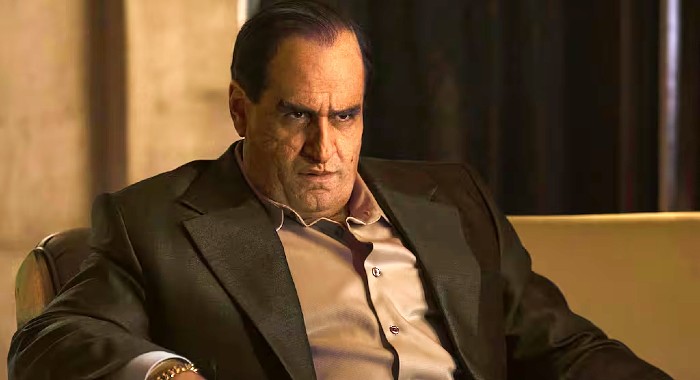

Let's Talk about Joel Edgerton's Horror Film 'It Comes at Night'
By Jodi Smith | Streaming | January 15, 2018 |
By Jodi Smith | Streaming | January 15, 2018 |

I found It Comes at Night to be almost unbearably slow and its intent murky at best. After that ending, SPOILERS AHOY, I couldn’t decide if director Trey Edward Shults was trying to warn us about trusting other people in apocalyptic situations OR if he was warning us what happens when you refuse to fully trust others in an apocalyptic situation.
Paul (Joel Edgerton), his wife Sarah (Carmen Ejogo), and their son Travis (Kelvin Harrison Jr.) live in the aftermath of a mysterious virus that appears to have wiped out a huge swath of the population. After Sarah’s father succumbs to the mystery illness, Paul and Travis take him into the woods, wearing respirators throughout, to shoot and then burn the old man. We learn that it is now just the three of them left in their huge house.
(I should point out that Shults uses Travis’ dreams to make the viewer uneasy about whether they are seeing reality or subconscious trickery throughout the film, because I don’t want to go that deep into the general plot.)
One night an intruder breaks into the house and is overtaken by Paul, tied to a tree in the yard with a bag placed over his head, and left to suffer for a night. Paul then speaks with the intruder, Will (Christopher Abbott), who insists he was looking for food for his wife and son. After speaking with Sarah, Paul and Will come to an agreement that they will travel to the location of Will’s family and bring them back. Will wants shelter and food for his family while Paul wants the animals Will’s family have in their possession.
Shults deftly weaves doubt and mistrust throughout every interaction between Will and Paul, including the scene where two men ambush them on their journey. In the end, Will and Paul return to Sarah and Travis with Kim (Riley Keough), Andrew (Griffin Robert Faulkner), and the animals in tow.
The two families agree to an uneasy alliance and Paul lays down rules to follow so that the virus doesn’t enter their residence. Don’t go outside at night. Keep the red door locked when everyone is inside the house.
The families grow close until one night when Travis awakens from a nightmare about his grandfather. He then finds Andrew asleep in his grandfather’s old room, and the child is sweaty and seemingly ill. He returns Andrew to his parents, who are deeply asleep, and then notices that the red door to the outside, that is always kept locked, is open. He alerts the rest of the home and Will and Paul find Stanley, their dog who had run off into the woods earlier, outside of the red door and clearly infected with the virus. The families get into a heated argument concerning whether Travis and Andrew are now infected.
The two families agree to isolate themselves within the house. Once in their separate areas of the house, Travis overhears Will planning to leave with Kim and Andrew. Sarah and Paul investigate while armed with guns and wearing their respirator masks, but Will is able to hold Paul at gunpoint and insist that they deserve half of what Paul’s family has. Everyone ends up outside and Will beats Paul before being shot and killed, along with Kim and Andrew.
Paul and Sarah return to the house. Travis has been infected as well. After he dies and is disposed of, we see Sarah and Paul are infected, sitting at their dinner table. They are clearly destroyed mentally and now physically from the events of the film.
I never really understood if the “It” in the title referred to the virus or to Will, as both come in the night and end up costing everyone their lives. I wasn’t sure if Shults was trying to point out that the lack of real trust between the two families was the reason the virus was able to destroy them all or if the little trust they had in working together was the reason they all died. Was it the compassion that killed them or the inability to be completely honest with each other?
According to Shults himself:
I see where things go, and to me, it’s devastating, and it’s terrible, and it’s what the movie’s kind of building to. It’s what it’s about. If the movie’s ultimate thing is about fear of the unknown—the ultimate unknown is death—I think that’s all over the movie. But there are worse things. And there’s a line you can cross that’s too far, and it breaks things, and if we keep functioning like this, and if we keep going in these cycles, we’re going to destroy ourselves. It’s inevitable. We need to take a step back. Losing our humanity is going to be a lot worse. -Via Slate
So the lesson is that in not trusting others, we expose ourselves to the worst of the world. We risk becoming the worst version of ourselves, never believing others and never seeing them as an ally, but only as an enemy that will need to be dealt with sooner than later. We become what we fear: death and regret. It doesn’t have to be a virus. It could be division brought on by anything. Perhaps a “president” that peddles lies and racism at every turn.
Ultimately, everyone wants to survive and protect themselves and their family from threats in the world. When Paul and Sarah allow Will’s family into their home, they are sharing their bounty with them and helping to make things less dark and lonely in a world torn apart by death. In never allowing themselves to fully know or trust Will, Kim, and Andrew, they are creating a festering resentment that ultimately eclipses their good intentions and leaves them empty. In the end, trust and communication are the only thing that can actually save us as we battle against any enemy. And I think I finally understand what it is that comes at night.
More Like This
Women Changed The Game And The Narrative At This Year's Olympics
Ben Shapiro, DailyWire+, and the Face-Eating Leopards
‘Ripley’ Is What 'Saltburn' Wished To Be
How 'Dune 2' and 'Shōgun' Handle the White Savior
Video Games Are Art and That's Okay

Three Trailers: Polymorphic Pattinsons Vs. Bonkers 'Brothers' Brolin and Dinklage
A New Series Explores the ‘Chaos’ Behind Superhero Franchises
Robert De Niro Couldn't Remember His Lines While Shooting 'Joker'
RFK, Jr. Had an Affair with 31-Year-Old Journalist, Olivia Nuzzi
‘We Live In Time’ Inspired Florence Pugh to Prioritize Her Love Life
Elle King Says Rob Schneider's Apology 'Means Nothing'
Pajiba Love

Where Were You When You Learned About The Penguin's Dong?
Reviews